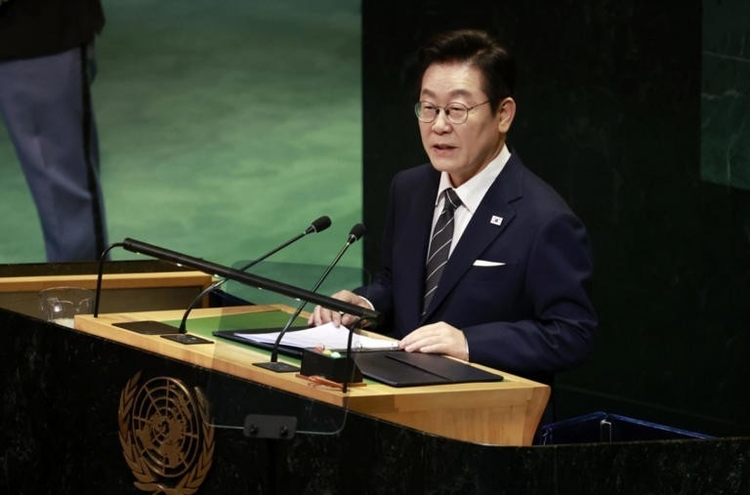By UN Journal Lee Jon-young
President Lee Jae-myung declared in his keynote address at the UN that "South Korea will fulfill its responsibility and role to end the Cold War on the Korean Peninsula and contribute to global peace and prosperity through the 'E (Exchange), N (Normalization), and D (Denuclearization) Initiative."
President Lee made these remarks in his keynote address at UN Headquarters in New York on September 23 (local time), stating, "We must end the era of hostility and confrontation on the Korean Peninsula through comprehensive dialogue centered on the 'END' initiative and usher in a new era of 'peaceful coexistence and shared growth.'"

President Lee stated, "The government of the Republic of Korea once again clearly states that it respects the other side's system, will not pursue any form of absorption unification, and has no intention of engaging in any hostile acts." He added, "Based on these three principles, we will first seek to break the vicious cycle of unnecessary military tension and hostile acts between the two Koreas."
He added, "While the denuclearization of the Korean Peninsula is undoubtedly a grave task, it is difficult to achieve in the short term. Based on this, we must seek realistic and rational solutions based on the sobering recognition that this is a difficult task." He added, "The international community must pool its wisdom on a practical, step-by-step solution that begins with the 'halt' of nuclear and missile advancement, progresses to 'reduction,' and finally culminates in 'dismantlement.'"
President Lee emphasized, "Going forward, our government will consistently seek ways to ease military tensions and restore trust between the two Koreas. The most certain peace is one without the need for fighting."
President Lee also said, "Today, at the UN General Assembly, where we will discuss the future of world peace and human prosperity, I proudly declare that the new Republic of Korea, a beacon of light for global citizens, has fully returned to the international community." He added, "Just as Nobel Prize-winning author Han Kang said, 'I hope you will lead me toward the light, toward the blossoming flowers,' the Republic of Korea will become a 'milestone of light' for all who will join us on our journey toward democracy."

He continued, "If someone asks me what the UN has accomplished, I will confidently answer, 'Look at the 80 years of history of the Republic of Korea.'" He added, "The Republic of Korea was liberated from colonial rule in the year the UN was established, and with the UN's help, it maintained its national identity amid the scars of division and the ruins of war, achieved industrialization, and blossomed into democracy."
President Lee then stated, "Despite the ceaseless efforts of each country, the international community's resolution and aspiration of 80 years ago to 'maintain world peace and security' remains an unfinished task for all." He added, "There is only one solution: 'more democracy.'"
He continued, "The Republic of Korea, which has grown thanks to the support and assistance of the UN, will now play a leading role by generously sharing its experience and history of democratic restoration." He added, "I hope the UN Security Council will also reflect the changing international environment by expanding its non-permanent membership and enhancing its effectiveness and representation."
The five permanent members of the UN Security Council—the United States, the United Kingdom, France, Russia, and China—hold veto power. Therefore, if even one of these five countries opposes a particular resolution, it will not be adopted.
The ten non-permanent members are elected for a two-year term. For a resolution to be adopted, nine of the 15 members, including permanent and non-permanent members, must vote in favor. Non-permanent members have one vote, equal to the permanent members. Members rotate in groups of five each year, and reappointment is not permitted. South Korea is currently serving as a non-permanent member in 2024-2025.
President Lee stated, "Physical factors aren't the only threats to peace. In an era where artificial intelligence (AI) technology determines security capabilities and cyberattacks threaten national security, we must confront not only visible enemies but also invisible ones."
President Lee stated, "As President of the Security Council, I expect the open discussion I will chair tomorrow will greatly contribute to the international community's efforts to promote the responsible use of AI. Furthermore, I intend to share our vision for the future of AI through the 'APEC AI Initiative' at the APEC (Asia-Pacific Economic Cooperation) Summit to be held in Gyeongju, South Korea, next month."




